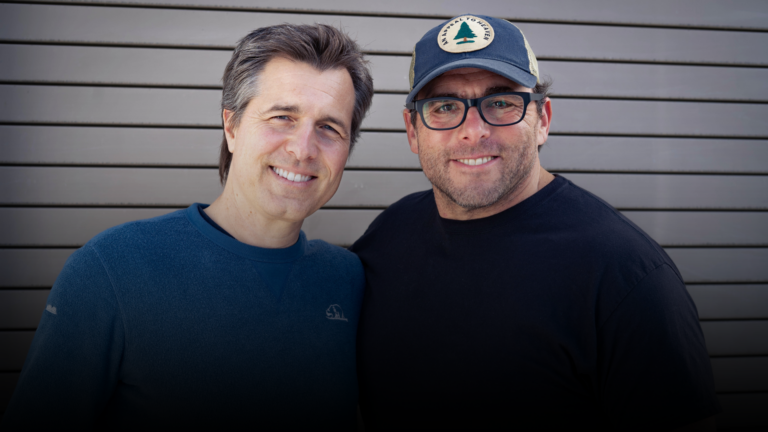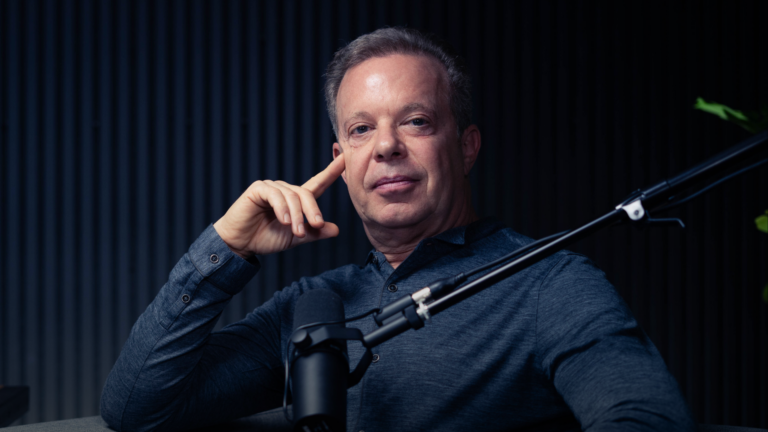What is it like to lead 59,000 people? What if those people are spread out all over the world? What does readiness as a leader look like? Chief of Navy Reserve (CNR), Vice Admiral John Mustin, knows exactly what it’s like and he leads with a singular, laser-guided priority in mind: warfighting readiness.
Vice Admiral Mustin’s achievements are epic. In a career that has spanned more than three decades, he has held numerous operational sea duty assignments, staff leadership roles, and command tours, leading men and women of the US Navy and US Navy Reserve around the world. He is a graduate of the United States Naval Academy, holds a Master of Science in Operations Research from the Naval Postgraduate School in Monterey, California, and a Master of Business Administration (cum laude) in Finance and Management from the F. W. Olin Graduate School of Business at Babson College.
His awards include the Defense Superior Service Medal, Legion of Merit, Meritorious Service Medal, Navy Commendation Medal, Navy Achievement Medal, Navy Battle Efficiency ‘E’, Military Outstanding Volunteer Service Medal and various service, expeditionary, unit and campaign awards.
When it comes to performing at the highest level, Vice Admiral Mustin is steadfast in his belief that individual performance is informed by both competence and character. We’ll find out how he helps instill these traits in his force and the challenges that come with it.
Vice Admiral Mustin has an extraordinary grasp on leadership philosophy, communicating effectively across large organizations, and using his civilian experiences to inform strategy within his military career – and he’s generous enough to share some of his insights with us around both organizational and personal high performance.
We covered so much ground in our conversation that we felt this episode was best shared in two parts. In audio form, be sure to listen to Part I and Part II. If you’d like early access to the full conversation, you can view the episode in its entirety on YouTube right now.
No matter when or where you tune in, we hope you enjoy this gem of a conversation with Vice Admiral John Mustin.
“I don’t care how hard this challenge is that we’re dealing with. We’re going to figure it out, and it’s going to be awesome. If you want to be a member of this elite high performing team, then that’s the way you carry yourself, and you work that down echelon with your folks too.”
In This Episode:
What is the Navy Reserve?
The Navy reserves about 60,000 citizen sailors as we describe them, and we’re an augmentation force that makes our Navy more capable and have greater capacity in the event of peace or war. So at its most basic level, we were born prior to the nation’s entry into World War I, so 1915, so we just celebrated our 108th anniversary. In every significant conflict since then, the Navy Reserve has augmented the active duty force for our nation. In World War II, we had two million sailors that were reserved, that served in the Pacific and in the Atlantic. So, the nation has come to expect that the Navy Reserve is not only ready to perform, but is qualified, certified, and able to mobilize when ready. So, the missions that we’re doing around the world, I’ve got people in every time zone, in every area of responsibility, every combatant command area that are serving right now.
Take action
As it relates to problem solving, I just don’t feel like we’ve got the time or the bandwidth to flail. We want to be ruthlessly efficient in addressing the root causes of problems in ways that are commonly understood. So in my case, what I tell people is, “Here’s how I want to take a brief.” I have some basic expectations before we sit down to talk about an issue. I want the problem statement to be explicitly stated, because what I’ve learned over the years is sometimes I get a 40-page PowerPoint deck that talks about all the reasons that the world is hard, and yet there’s nothing actionable in there, because they’re trying to boil the ocean.
Leadership responsibility
It’s easy for us to leap into activity and say, “Something broke. Slap some duct tape and bubble gum on it, and declare victory,” when in fact what we really need to do is think about, “Why did this happen, and what was it systemically?” In many cases, when we’re talking about human beings, there’s a degree of variability that we have to accept, but I always look at it as the owner of the system to say, “What could I have done differently to either train or enable the people to perform better?” That’s my question. I look in the mirror every day, and say, “It would be easy for someone to say, “This sailor did something stupid, and we should throw the book at him.” My first thought is, “What could I have done differently that might have prevented the decision that that person made?”
Optimism in high performance
I wake up, and I think to myself, “Okay, today, I get to make some decisions.” One is am I looking for the good in this day, or am I looking to complain about all the things that are difficult in the day? So, the other thing that I realize is I’ve got a staff, and I’ve got a team, and they’re looking at me. If I come in, and I am moping and grouchy and pissed, they’re going to be too. Instead, I want to greet them every day with a sense of optimism like, “Hey, I don’t care how hard this challenge is that we’re dealing with. We’re going to figure it out, and it’s going to be awesome.” If you want to be a member of this elite high performing team, then that’s the way you carry yourself, and you work that down echelon with your folks too. So in order to participate, I’m pretty candid saying, “I only want high performers on my team.”
Frontloading expectations
I greet everyone on my staff within the first week of their arrival. I sit down with them, and say, “Okay, you’re coming to work in my manpower shop. Thrilled to see you. Your reputation precedes you. I’ve read your biography. I got a couple of questions about where you live and what your interests are. Just so you know, you’re relieving a person who was the best in this job that I’ve ever seen, and my expectation is you’re going to be better than him. If that doesn’t sound good to you, then now’s the time to mention it to me, because I can find you another job, but my hope is that you’re going to fit in, and you’re going to pick up that baton and run fast.” Then honestly, everyone says, “I can’t wait to contribute, sir…” I describe this approach when I do meetings with my team. When they’re new, when we do an indoctrination period, I’ll say, “Here’s what you can expect from me. I am going to envision, enable, and encourage you.”
Prioritizing problems and solutions
The first thing I ask is, “Where are we relative to the standard?” Because a lot of times people come in and say, “We need to change this. I need more people. I need more money. I want to do something.” And I go, “Okay. Well, first let me get a sense of the scale of the problem. Where are we now?” The answer is not always, “Thanks for asking,” it’s measured very carefully. We know exactly a lot of times it’s, “Well, of course, we know we need to do this.” I go, “Okay, well show me.” And then the second thing is, “So what’s the recommendation that you’re making? And how much better will the outcome be based on this recommendation? If we implement fully the change that you recommend, how much better will we be relative to our performance today?” Ultimately, what I’m getting at is I want them to understand the quantitative rigor to assess whether, “Is it worth it for us to do this?” I get a hundred problems every day and sometimes I say, “You’re right. This is not perfect. It’s number 20 on my top 10 list, though, I just don’t have the time to dig into it. If you can affect the change, then more power to you.” But the things that I want to sink my teeth into are the things that are going to give us a 100% X return, the ROI, like a portfolio manager. I want to move on the most impactful things because the other thing I recognize is if it was easy, it wouldn’t come to me, it would’ve been done already. So I walk in the door every day saying, “I welcome the fact that everything that is brought to me is going to be complicated and unsolvable,” and then we’ll solve them.
Assessing tomorrow’s problems, today
I see similarities to the United States in 1939 to where we are right now. And I’m not Chicken Little, and I’m not trying to scare people, but I’m saying that the readiness of the Reserve Force is something that I need to solve today because if we need to break glass because of emergency in say, 2027, I don’t want them to start saying, “How are we going to mobilize 50,000 people? Gee, we didn’t think of this. Are they ready to go? And do they know what building they’re going to go to? Does their ID card work? Have access to the desk?” Those are things that I want to work on today.
Serving yourself to serve others
The older I’ve gotten, the more I’ve seen the importance for the balance between mental, physical, and spiritual wellness, no question. And what I used to be able to get away with as a younger man was to eat terribly, exercise vigorously, and pull all-nighters, and celebrate with a cup of coffee in the morning for breakfast. And my famous line was, “I can sleep when I’m dead.” And what I’m finding now though is I am not as cognitively sound if I don’t get the right amount of sleep, I don’t have the energy to perform like I know I need to if I don’t exercise. And so as a result, what I’m doing now is incorporating a far more rigorous and healthy approach to diet, to exercise…And then cognitive function is impacted by everything else I just described. And then the spiritual piece, everybody can interpret spirituality differently, but having some time to either meditate, or breathe, or think, or atone is important because anything that I find allows your brain to shift gears a little bit from rigorous analytical behavior to thoughtful, quiet thinking, I think that’s a great unlock.
Be a good teammate
Do you want the 11 best players or do you want the best 11 players? I always say, “If I’m evaluating productivity or the outcome, not output.” I mean, I view output as activity metrics. I’m more about outcomes. What difference does it make? And so I just evaluate this. I mean, there’s not a framework for it, but I’m watching to see who’s the all-star diva whose chemistry is terrible that degrades the performance of the team as opposed to the person, as you mentioned? I feel like I can train anybody with the skills to be successful on a staff, but the chemistry check is the critical enabler. That’s what I’m looking for.
Transferring military leadership to his civilian life
The military training was definitely applicable to leadership roles. I mean, I’ve been a C-suite executive in many occasions, CEO. I own a company that I founded. So the idea of establishing a vision, creating the enabling mechanisms to allow folks to perform, setting the expectations for performance. I mean, those are all standard military approaches that are directly applicable in a civilian sector too. Doesn’t matter if you’re wearing a uniform or a suit.
Trusting your people
We start from a foundation of we’re all trustworthy, we’re all working together. We assume positive intent. But as it relates to the telework thing, the reason I bring that up is I say, “Look, I trust you all.” There are going to be times when your child has a bloody nose at school or needs to go to the doctor, or you need to meet the cable guy, or your car breaks down. Go take care of that.” I’m not worried about you being productive and I’m not worried about you being gone. You know the work that you’re responsible for and you’re accountable for. And as long as you can do it, I don’t care where you do it.
Hiring veterans and reservists
I gave a talk at South by Southwest about this, I mean long before I was even a flag officer, because I felt very passionate about veteran hiring. And the idea was we have pretty lofty terms that we talk about our core values in the Navy. It’s honor, courage, and commitment. And in the army you may have heard duty, honor, country. And you may hear those and go, “Yeah, okay, puffery words, I’ve heard them all before.” My comment to you is they mean something and they mean something to everyone who wears the uniform. Not only is there an appreciation for some of the soft skills, they’re going to have good hygiene and show up on time and be responsible and accountable. What I learned by hiring a bunch of folks who were younger people, straight out of college or second jobs out of college was developing culture is very hard. We take it for granted in the military because it’s baked into what we do. Replicating that is really hard. When you hire veterans, they know that too, and they’re the ones that are going to make it happen.
Confidence in your people
I’m not going to give you an instruction manual for every decision you’re going to make. I trust you and you’re responsible for it. We all agree that we are laddering up to this mission and you each have a role and function, and I’m standing by to support. Next time you come back to me, tell me either what you need or that you’re done… It’s the antithesis of micromanagement. And again, it is predicated on a couple of things. One is absolute trust. You have to be confident. I have to be, as a leader, confident that my people understand when we say the mission, do we all have a shared understanding of what it is we’re trying to accomplish? Two, do I have the trust that they can do it? Are they equipped? Are they capable? Are they trained? Is it possible for them to do what I’m asking of them? They may say, “I got a boss, I’m good,” which may be false bravado if I go, “Really? How are you going to do that? You don’t even have any of the equipment you need.” The trust piece is important.
Living “up” to the family legacy
My assumption is they’re going to think this guy thinks he’s got an in or he is not going to have to work as hard. I went to the Naval Academy, and as a plebe, as soon as people found out, “Oh, wait a minute, your dad’s an admiral?” Okay, it’s not good to be a plebe at the Naval Academy with when your father’s an admiral… And so my view was always, you know what? I’m going to try that much harder and I’m just going to be the best. And then there won’t be any discussion. So no one will have to worry about, okay, did someone cut into him or not? My view was let’s just make it so apparent that, hey, I was selected based on performance.
Leaving his own legacy
The greatest legacy we’re going to leave is our children and the people that we trained. I’ll have 20 years of officers and sailors that have been part of my staffs and commands that will be doing great things way after I’m gone. And if they continue to do great things, then that’s probably the best reflection of my contribution.



